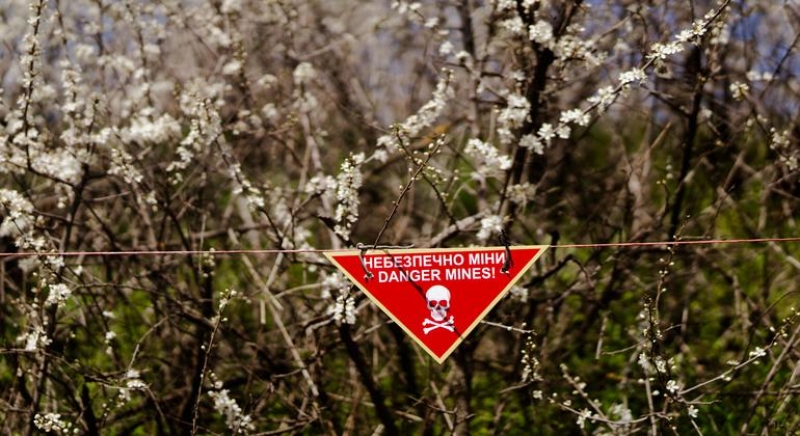- India Sees 9% Drop in Foreign Tourists as Bangladesh Visits Plunge |
- Dhaka Urges Restraint in Pakistan-Afghan War |
- Guterres Urges Action on Safe Migration Pact |
- OpenAI Raises $110B in Amazon-Led Funding |
- Puppet show enchants Children as Boi Mela comes alive on day 2 |
UN Warns Against Mine Ban Withdrawals Amid Civilian Toll

A sign warning of landmines in Ukraine.
The UN’s top human rights official on Wednesday expressed grave alarm that six European countries are either in the process of, or considering, withdrawing from the international treaty prohibiting anti-personnel mines.
Estonia, Finland, Latvia, Lithuania, Poland, and Ukraine have taken or are considering steps to withdraw from the Convention on the Prohibition of the Use, Stockpiling, Production, and Transfer of Anti-Personnel Mines and on their Destruction – also known as the Ottawa Convention, after the Canadian city where the process was launched.
“These weapons risk causing persistent and long-term serious harm to civilians, including children,” Volker Türk, UN High Commissioner for Human Rights, said in a statement. “Like other international humanitarian law treaties, the Ottawa Convention was principally designed to govern the conduct of parties to armed conflicts.”
“Adhering to them in times of peace, only to withdraw from them in times of war or for newly invoked national security considerations, seriously undermines the framework of international humanitarian law.”
Anti-personnel mines are one of the two main types of mines and are designed to target people – as opposed to anti-vehicle mines. However, because both types are triggered automatically, they result in huge numbers of civilian deaths, especially among children.
Their deadly risks linger long after hostilities end, contaminating farmland, playgrounds, and homes, and posing a constant threat to unsuspecting civilians.
Agreed in 1997, the Ottawa Convention prohibits signatories from using, stockpiling, producing, or transferring anti-personnel mines due to the threat these weapons pose to civilians, especially children.
In the two-and-a-half decades since it was passed, the Ottawa Convention has 166 States Parties and has led to a marked reduction in the use of anti-personnel mines.
However, in recent years, these positive trends have begun to reverse, with the number of civilians killed and injured by mines increasing by 22 percent in 2024 – 85 percent of the casualties were civilians, and half of them were children.
Despite progress, some 100 million people across 60 countries still live under the threat of landmines.
In Ukraine, for instance, the UN Mine Action Service (UNMAS) estimates that more than 20 percent of the country’s land is contaminated – amounting to 139,000 square kilometres.
Similarly, landmines remain a significant threat in Cambodia, decades after the end of conflict and years of demining efforts.
Mr. Türk urged all parties to the Ottawa Convention to uphold their international legal obligations regarding anti-personnel mines, and called on non-signatories to join the Convention.
“With so many civilians suffering from the use of anti-personnel mines, I call on all States to refrain from leaving any international humanitarian law treaty, and to immediately suspend any withdrawal process that may be underway,” he said.

